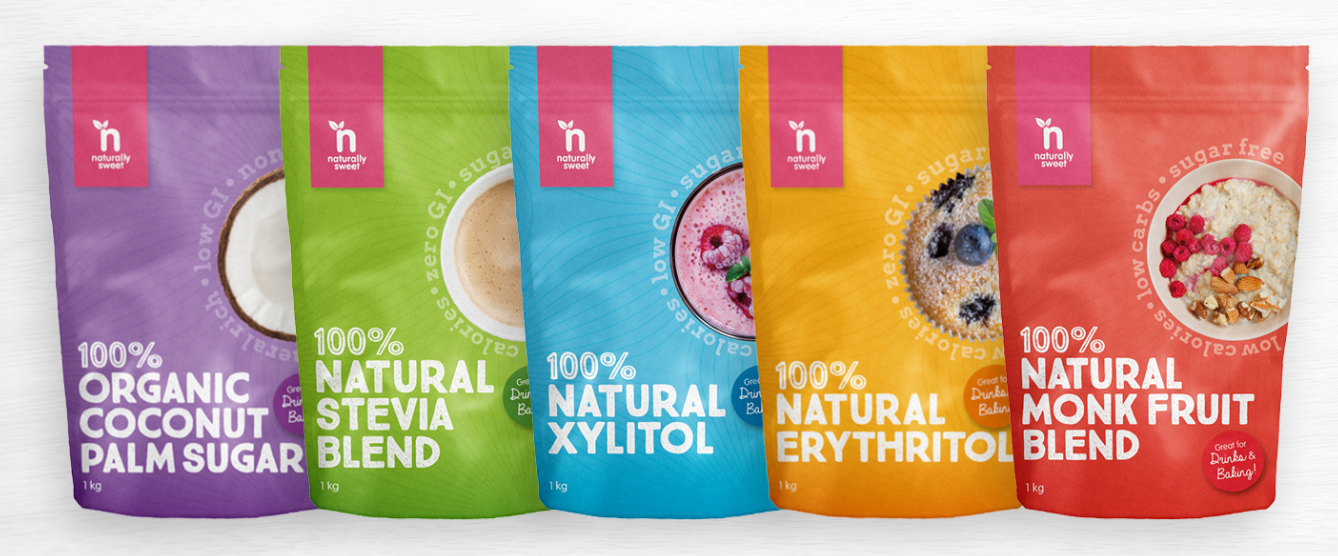Product Comparison Information
| Naturally Sweet Xylitol | Pure Stevia | Naturally Sweet Erythritol | Naturally Sweet Stevia Blend |
|
|---|---|---|---|---|
| Source | Vegetable fiber (hydrogenated xylose fiber from corn). | Stevia Rebaudiuna (leaf) | Occurs naturally in fruits, such as pears, but produced commercially by fermentation of corn, wheat, or sugar beets. | Rebaudiuna A98 (Reb A98)+ Erythritol. Reb A is the sweetest part of the Stevia leaf. |
| Sweetness | Approximately 100% as sweet as cane sugar | Between 250-450 times sweeter than cane sugar | Approximately 70% as sweet as cane sugar | Blended for sweetness. 4gm = 1 teaspoons of cane sugar. |
| Aftertaste | No | Raw stevia has a somewhat bitter or licorice-like aftertaste, although Rebaudioside A component has very little aftertaste. | No | No |
| Caloric Content | 2.4 Kcal/g | 0 | 0.2 kcal/g | 0.2 kcal/g |
| Glycemic Index | 7 | 0 | Approximately 0 | Approximately 0 |
| Blended with Excipients | No | No | No | Yes, blended with Erythritol to reduce bitter after taste of natural Stevia. |
| Chemistry of Solution | Absorbs heat from mixture if added as dry ingredient to wet ingredients. | Insignificant heat of solution, due to small amounts used. | Absorbs heat from mixture if added as dry ingredient to wet ingredients. | Absorbs heat from mixture if added as dry ingredient to wet ingredients. |
| Blended Properties | Provides same amount of bulk as sugar, but increases product moisture. | Recipes must be adjusted to provide bulk from other sources | Provides bulk, mouth feel, and moisture equivalent to sugar. | Provides bulk, mouth feel, and moisture equivalent to sugar. |
| Hygroscopic Properties | Yes, somewhat more water-absorbent than cane sugar. | Absorbs atmospheric moisture during storage. No appreciable influence on miscibility of food ingredients due to small amounts used. | No, needs to be mixed with hygroscopic sugars. | Somewhat less water-absorbent than cane sugar. |
| Health Effects | In chewing gums, makes saliva more alkaline, helping tooth enamel absorb minerals and reduce plaque Chewing action relieves ear and sinus infections. Assists teeth with remineralisation. Stimulates salivary flow in dry mouth. Used by diabetics as part of diet for good glycemic control. (See note) |
May increase insulin sensitivity. May increase calcium absorption and bone mineralization. Traditional remedy for heartburn. Used by diabetics as part of diet for good glycemic control. (See note) |
"Starves" bacteria that can cause tooth decay. Assists teeth with remineralisation. | Combines benefits of erythritol and stevia. (See respective notes) |
| Correcting the Common Misunderstandings | Increases hydration in the mouth, giving product a "juicy" mouth feel. | Approved as a food additive in Australia, New Zealand, USA, Japan and France. | Does not cause stomach upset, but the inulin to which it is often added does. | See Stevia. The intense sweetness of natural stevia with the fullness and mouth feel of cane sugar. |
| Gastric Side Effects | Occasionally, when consumed in large amounts (more than 50 g per day in children, more than 200 g per day in adults) | None | No, fully absorbed by the body. | None |
| Commercial Applications | Baked Goods Confectionery Home Use Beverage Sweetener |
Ice creams Frozen Product Beverages Nutritional Blends |
Bulking agent for stevia Candy Ice creams Yogurts Frozen products |
Confectionery Ice creams Yogurts Frozen products |
| Melting Point/Boiling Point | Melt: 92-96° C Boil: 216° C |
Stevioside: Melt: 196-202°C Boil: Approx 315°C |
Melt: 121° C Boil: 329-331° C |
Approximately the same as Erythritol: Melt: 121° C Boil: 329-331° C |
| Density | 1.52 g/cm3 | 3.10 g/cm3 (Steviol Glycoside) | 1.45 g/cm3 | Approximately 1.45 g/cm3 |
| Labelling |
Sugar Free |
Organic or JECFA Sugar Free Non GMO Vegan |
Sugar Free Natural Non GMO Vegan |
Sugar Free |


